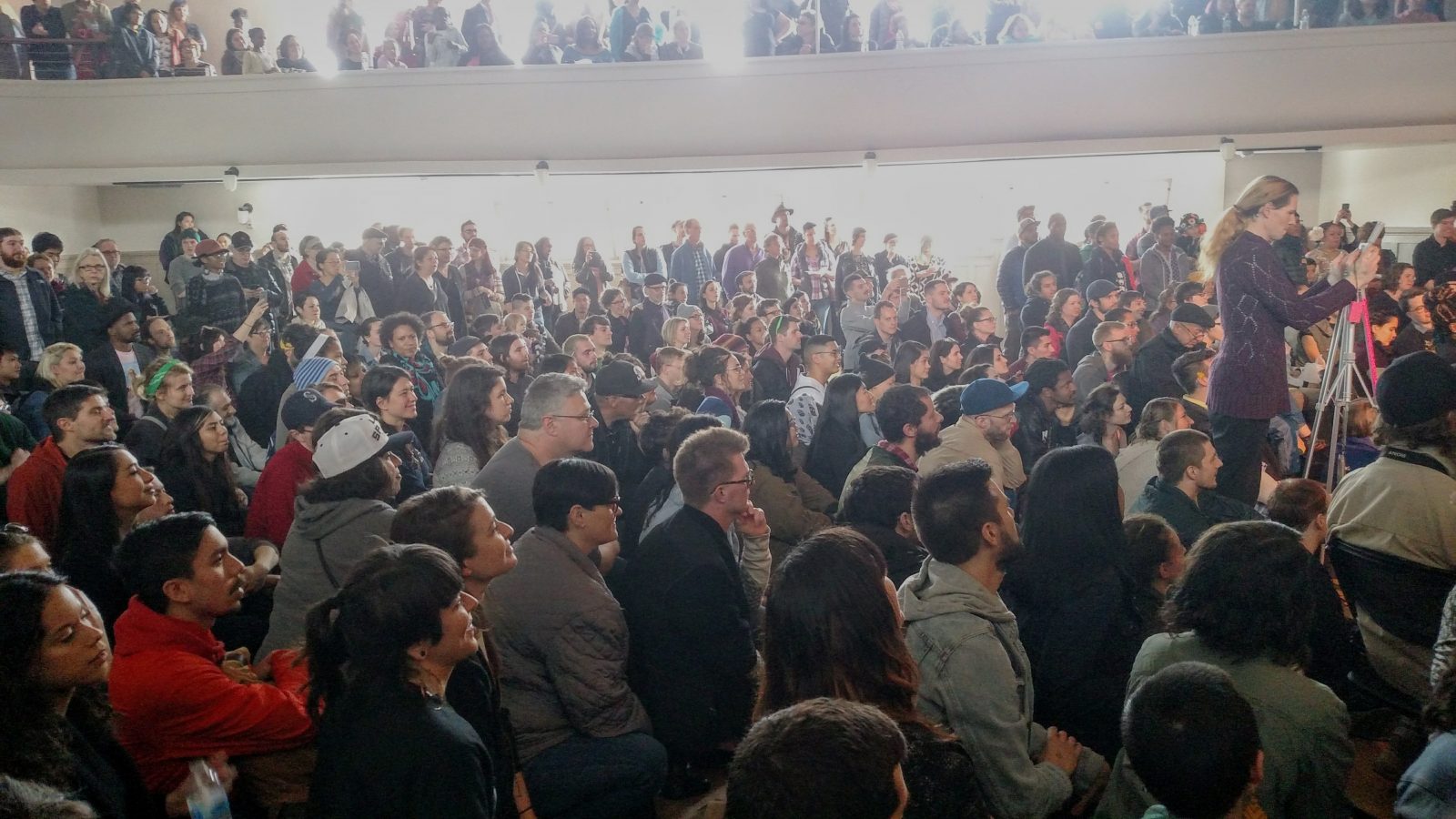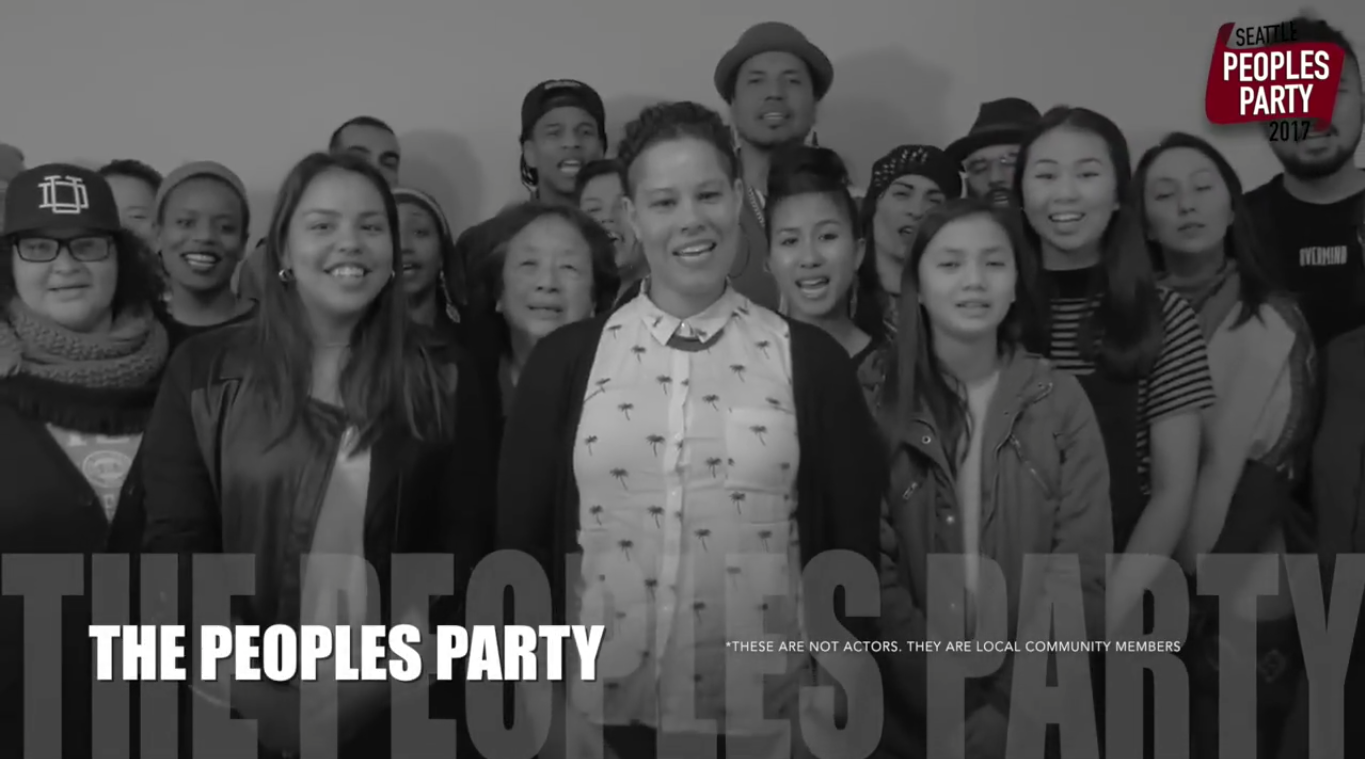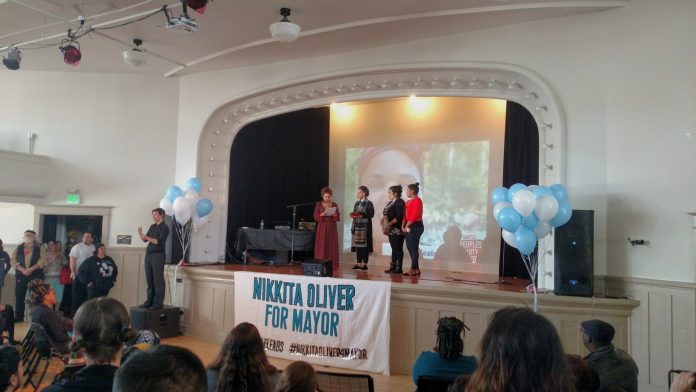On Sunday, poet and activist Nikkita Oliver launched her campaign for mayor of Seattle to a capacity crowd at Washington Hall in the Central District. In her speech, Oliver criticized Mayor Ed Murray’s approach on homelessness, among other issues.
“In 2015 Mayor Murray announced a state of emergency, and yet since then we haven’t seen much done,” Oliver said. “There are thousands of people living unsheltered, hundreds of them children. They’re being swept, traumatized, and, little by little, what little bit of stability they can find continues to be chipped away from them–taken away from them. And in one of the wealthiest cities in the United States, there’s no excuse for this.”
The following day, Mayor Murray called a press conference and said he was scrapping the homelessness levy that would have raised $275 million over five years he had announced at his 2017 state of the city speech. To replace the funding, he and King County Executive Dow Constantine unveiled a new plan to pass a King County-wide 0.1 cent sales tax to raise $68 million per year for homelessness county-wide. Exactly what programs they’d fund they didn’t know.
“Both Murray and Constantine were light on specifics in terms of what the county sales tax increase would fund exactly, stating that they would convene a joint task force of regional leaders, service providers, and other stakeholders to develop a plan in the coming months,” Josh Kelety reported at Crosscut.
The county sales tax would go on the ballot until 2018, unlike the Seattle property tax levy which Murray had pledged swift action to get on the ballot this fall. Thus, as Oliver alluded to, even though the homelessness crisis pushed Mayor Murray to declare a state of emergency in 2015, his big solution doesn’t seem headed to a vote until 2018. Even then, who knows if it will pass and how soon it could make a dent in the crisis.
Whose Idea Was It Anyway?
While Murray was calling the property tax measure his idea, billionaire progressive donor Nick Hanauer told The Seattle Times the homelessness levy was his idea which he had been working for many months before taking to Murray, who then unveiled it and announced he had tapped Hanauer with carrying it out. “We just decided we were going to do something, and no one can stop that. And once that bus leaves the station, people can get on or get run over,” Hannauer reportedly told the Times. It appears the bus decided not to run anybody over, after all. Hanauer joined Murray for his Monday press conference and even volunteered an assist that a sales tax was progressive because he (a billionaire) buys more stuff than a poor person. Guess the noted progressive donor doesn’t understand progressive tax policy.
Meanwhile, the sales tax similarly didn’t originate with Murray and Constantine who jumped on the bandwagon after King County Councilmembers Rob Dembowski and Larry Gossett pushed a proposal to replace the arts levy Constantine proposed in his State of the County speech with a homelessness levy.
On March 23, [Councilmembers Dembowski and Gossett] pitched a 0.1 percent sales-tax hike for homelessness on the August ballot, arguing leaders should prioritize unsheltered people before arts, science and culture.
Rather than fight the idea, Murray and Constantine adopted it — for 2018, Dembowski said. He and Gossett may continue to push for an earlier vote.
To further complicate matters, voters will be asked in November to renew — and likely to boost — the county’s expiring veterans and human services property-tax levy.
Passing two county sales tax increases in 2017 may be a tougher pill to swallow, hence Murray and Constantine’s move to put the sales tax for homelessness on the ballot in 2018. On the other hand, that would put the vote three years into the county’s state of emergency on homelessness.
Regressive Taxation
Nikkita Oliver and the Seattle Peoples Party (with which she’s running) quickly responded to Mayor Murray’s backtracking in a South Seattle Emerald op-ed:
While the Mayor and billionaire Nick Hanauer’s proposed property tax levy was misguided and regressive, many were thankful that he took some decisive action when he proposed to raise taxes to pay for homelessness services.
But the Mayor promptly backed out of that plan barely a month after proposing it. Now, the Mayor wants to move on an equally regressive King County wide tax which will disproportionately impact low-income families and communities of color. This impulsive behavior, combined with the fact the Mayor has taken no effective action on homelessness, leads the Peoples Party to believe the Mayor has no vision for how to address this crisis.
The Peoples Party has a vision and a plan. We will work with stakeholders to create progressive tax structures and luxury taxes on corporations in order to ensure that all Seattleites who need and want housing have equitable access to affordable housing options.
Calls to tax the rich proved quite popular–with the Peoples Party supporters, judging by applause on Sunday.

While not everyone agrees whether the sales tax or property tax proposal was more regressive, most people can agree neither had a particularly progressive tax structure. Murray said the average county household would pay $30 more per year in the new sales tax proposal. Under the property tax proposal from February, Murray said the median household would pay “around 13 dollars per month.” That would be about $156 per year. The $68 million per year sales tax burden won’t fall as heavily on Seattle versus the $55 million levy proposal. However, the benefits will also have to spread over a county that is closing in on 2.2 million people. Seattle makes up just shy of one third of the county’s population meaning that if proceeds were distributed by population share, Seattle’s share would be about $22 million.
While we’re talking funding, it’s also worth noting that Nikkita Oliver has been active in the No New Youth Jail movement, which has proposed re-dedicating the $225 million set aside for the county youth jail (funded through a 2012 King County property tax ballot amendment) to more community-focused uses like homelessness services, affordable housing, and education. Executive Constantine is forging ahead with the existing youth jail plan anyway.
The Homelessness Plan Shuffle
Many housing advocates greeted the county sales tax proposal with skepticism. Why fund a homelessness measure with a regressive tax that will fall hardest on cash poor people? The property tax measure was not a progressive tax structure either, but at least it would not fall upon the homeless people it sought to help.
Murray insisted that was just the hand he had been been dealt since state supreme court case law precludes a state income tax and state legislators haven’t been interested in changing that. It appears a state income tax will be illegal until some jurisdiction like Seattle or King County gets the courage to pass one and force a new state supreme court case, a strategy proposed by John Burbank of the Economic Opportunity Institute. The Transit Riders Union is seeking to carry out the strategy this year with a 1.5% tax on incomes above $250,000 in Seattle. For his part, Murray served in State Legislature, much of the time in leadership positions, for 18 years prior to taking office as Mayor in December 2013. Murray claims he supported a state income tax while in Olympia although it doesn’t seem he or his colleagues brought forth legislation.
Recently, Mayor Murray expressed muted interest in the Transit Riders Union effort to pass an income tax in Seattle, as he was quoted in The Seattle Times: “Today’s proposal … is intriguing, though it faces a long legal road before any revenue could be collected, making it ill-fitted to address some of our immediate needs such as homelessness and possible federal funding cuts.”
Nikkita Oliver’s speech (which you can watch below starting around 2:00:00) Sunday made clear she would support sweeping tax reform to make the code more progressive.
Oliver agreed with Murray about creating navigation centers, although she expressed doubts that one should be located in the International District. Her plan on homelessness includes ending the homeless camp sweeps and enacting progressive tax structure to fund more public housing and shelters, including day shelters which are in short supply today.
Homelessness Policy Details

So far, the Peoples Party platform proposes three action items on homelessness including navigation centers, adequate shelter and permanent housing. The permanent housing section includes an endorsement of Housing First policy.
Position: Working to provide permanent housing for people who need it, rather than criminalizing their attempts to survive outside, is known as “Housing First.” This approach has been successful at reducing chronic homelessness in Houston and in Utah. Evidence demonstrates that securing housing first enhances peoples’ chances of achieving stability. Unlike other homelessness programs, Housing First does not insist on preconditions like sobriety, psychiatric care, or moving through transitional housing. Finally, Housing First saves money while reducing chronic homelessness.
Action agenda: Nikkita will work with stakeholders to create progressive tax structures and luxury taxes on corporations in order to ensure that all Seattleites who need and want housing have equitable access to affordable housing options.
While Oliver’s broad strokes on homelessness are promising, her still vague programs rely on uncertain funding sources. That is par for the course for a candidate still in her first month of candidacy. That said, supporting progressive taxation like a municipal income tax would provide inspiring leadership even if Oliver might want a contingency plan if progressive tax reform proves time consuming.
We may be closer than any time in recent memory to breaking Seattle’s mayoral glass ceiling for just the second time ever and for the first time in 92 years. Whether you agree with her on not, Oliver putting women of color front and center in her campaign has got to be a healthy thing for Seattle and its long line of white male mayors only briefly interrupted by Norm Rice.
Doug Trumm is publisher of The Urbanist. An Urbanist writer since 2015, he dreams of pedestrian streets, bus lanes, and a mass-timber building spree to end our housing crisis. He graduated from the Evans School of Public Policy and Governance at the University of Washington in 2019. He lives in Seattle's Fremont neighborhood and loves to explore the city by foot and by bike.


